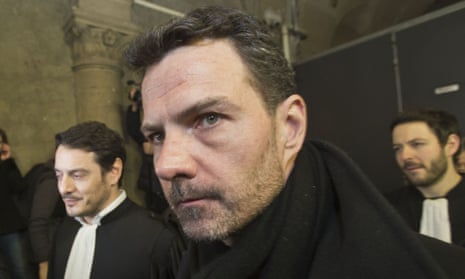A French tribunal has ordered Société Générale to pay €450,000 in damages for unfairly firing the rogue trader Jérôme Kerviel, whose unauthorised trades spiralled into massive losses in 2007 and 2008 and almost bankrupted one of Europe’s biggest banks.
Kerviel, 39, whose deals lost the bank €4.9bn (£3.82bn), sued for wrongful dismissal and the tribunal agreed. It ruled he was fired “without real or serious cause” and that the bank had full knowledge of his shady dealings long before he was fired in 2008.
The judgment – described in France as spectacular – is the first positive verdict for Kerviel in his eight-year battle to throw the spotlight back onto the bank which he claims was well aware of his trading which initially generated profits before going wrong.
The Kerviel case was one of the biggest bank trading scandals in history but he maintained that he was just one cog in a rotten machine and had been made a scapegoat for the bank’s whole system.
In October 2010, Kerviel was sentenced to three years in jail after being convicted by a Paris court of breach of trust and fraud in the loss of €4.9bn in equity derivatives trades that went wrong in 2008.
He was released in September 2014, with an electronic bracelet, after spending less than five months in prison.
Kerviel continues to claim his superiors knew what was going on and deliberately turned a blind-eye as long as the profits kept rolling in. The bank has insisted it was not aware of his actions.
SocGen’s lawyer, Arnaud Chalut, said the employment tribunal ruling for unfair dismissal was “scandalous” and the bank would appeal against a decision that he said ran counter to the law.
Kerviel’s lawyer David Koubbi told Reuters that the tribunal’s decision “restores justice and tears apart the story that Société Générale has presented from the beginning”.
The public image of Kerviel, who came from a working-class family in a small town in Brittany before working his way up at the bank, has gradually been transformed from villain to a kind of folk hero fighting against the power of the banking world.
Before his prison term, he met the Pope and walked from Rome to France in a kind of pilgrimage against the excesses of the financial system.
A separate civil case is due to open this month before an appeals court to decide how much Kerviel has to pay the bank towards the losses. He had initially been ordered to pay €4.9bn in damages to the bank, the full trading loss, but that was overturned.
French investigators are also currently weighing Kerviel’s request for a retrial of the criminal case.
Kerviel mounted a fresh legal challenge after Nathalie Le Roy, the police officer who led the Kerviel investigation in 2008 and 2012, last year expressed concerns about how she was pressured to focus solely on evidence that would incriminate him, and said Kerviel’s superiors must have known what he was doing. The financial police contested her account.
